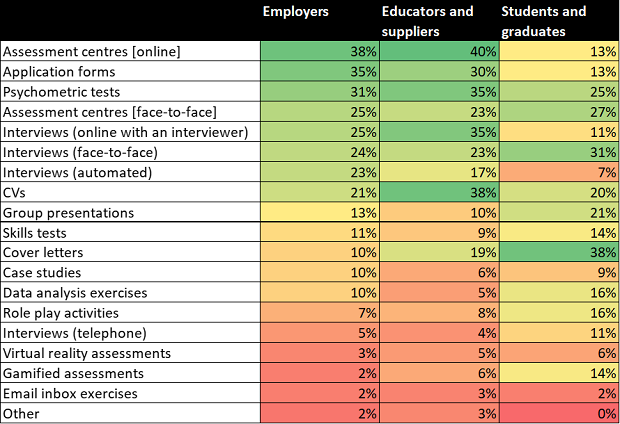New research suggests that students may be out of touch with online recruitment practices, says Helen Liddle, University Partnerships Manager at SRS.
As part of our recent Skills for Success webinar, ISE’s Tristram Hooley and I reviewed new research indicating that students may be out of touch with online recruitment practices.
Employers use a range of approaches to assess for key skills in the recruitment process. They are broadly in agreement about which of these approaches students need the most support with, but do students recognise this?
To understand more SRS and ISE polled 482 ISE members and 567 students and recent graduates. We will also be sharing this research as part of a free student webinar on Thursday 29 July at 10am. Click to register.
Key findings
Based on previous ISE research and student feedback, we selected 12 key skills that are important to demonstrate in the recruitment process.
What approaches are employers using to assess different skills?

In particular, employers had chosen problem solving, resilience and learning agility – all of which are mainly assessed as part of an interview or assessment centre.
There are other opportunities to demonstrate these skills, such as problem solving assessed as part of psychometric tests and group exercises. However, it’s very clear that assessment centres continue to be one of the most important parts of the student recruitment process. Primarily, they are used to simulate the requirements of the role and to assess candidates in workplace scenarios, therefore helping to predict a candidate’s future performance.
Recruitment approaches where students need more support

Students certainly recognise the importance of being prepared for assessment centres, but 27% of them want support with face-to-face events as opposed to only 13% wanting support with online assessment centres.
This leads us to question whether students appreciate the extent to which assessment centres and indeed other aspects of the recruitment process will be online in the future. For example, an ISE poll of 198 employers in April confirmed that 39% of their assessment centres would be online, with a further 42% delivering a blended approach from September 2021.
Benefits of digital
- Employers have certainly seen the following advantages of a more digital approach:
- Not being limited by location makes it possible to collaborate across multiple sites.
- Instead of travel and other expenses, budget can be diverted into creating a more personalised and engaging experience for candidates.
- No paperwork and a more streamlined approach.
- Technology can make it more accessible for some groups who struggle in a face-to-face environment. In turn, this has had a positive effect on attendance rates.
- Allows you to test the digital literacy of candidates and the skills which will be particularly relevant in the ‘new normal’.
- Recording exercises can make it make easier to audit and quality check processes.
- Gives you the opportunity to standardise feedback, as well as provide feedback more quickly and efficiently.
Therefore, students and graduates should definitely seek to improve their confidence and understanding of these digital recruitment approaches, particularly as 38% of employers think that they need more support with online assessment centres.
A quarter of employers have also identified that students and graduates need more support with online interviews, whereas only 11% of students agree. Instead, 31% of them want support with face-to-face interviews – perhaps further evidence that students are out of touch with the most up to date recruitment practises.
In our experience, we find that there is some nervousness from candidates on how to use different platforms, when to speak in virtual group exercises and how to build that rapport with others in a digital environment.
Solutions for students and employers
To tackle some of these issues, we have created a custom support plan for students who attend our virtual assessment centres. This includes:
- A comprehensive communications plan, with a series of emails sent leading up to the event. These emails include instructions for the virtual assessment centre, briefing videos, and top tips.
- A technical support guide, detailing how to use the digital platforms and how to troubleshoot any issues.
- Pre-event webinars, where we walk students through the process and host a live Q&A.
- A ‘one-stop-shop’ event webpage, including resources, instructions, and materials which students need to succeed.
- Regular check points and a dedicated support team – through email and a live ‘chat box’ function on our digital assessment platform.
The more exposure we give candidates to digital practises, the better. At SRS, we have our own digital assessment platform, assess.digital: a user-friendly digital platform that streamlines assessment processes and provides a seamless experience for candidates, assessors and admin teams.
Visit https://assess.digital/ to find out more about the SRS digital assessment platform and request a free demo.
SRS is also offering organisations a free one-month trial of assess.digital, which you can register for at bit.ly/assess-digital-trial.
Read more about Skills for Success


0 Comments